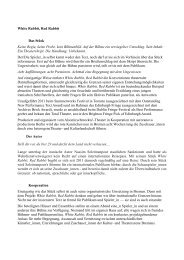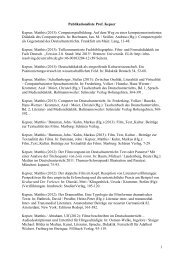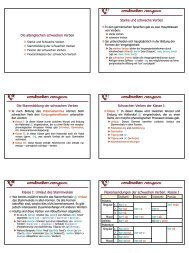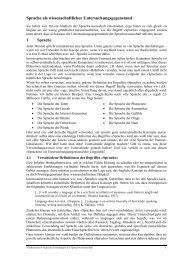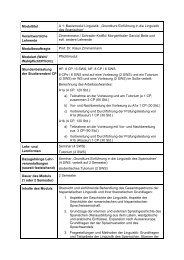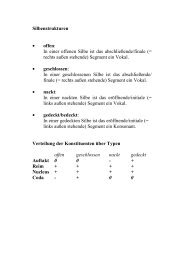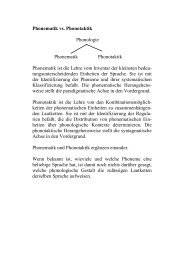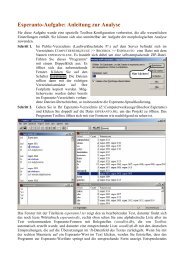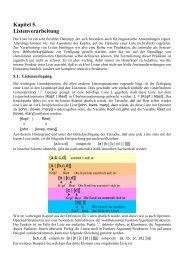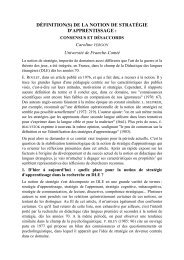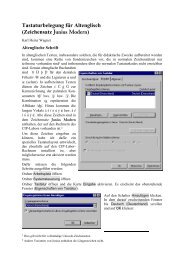Relativism and Universalism in Linguistics - Fachbereich 10 ...
Relativism and Universalism in Linguistics - Fachbereich 10 ...
Relativism and Universalism in Linguistics - Fachbereich 10 ...
Create successful ePaper yourself
Turn your PDF publications into a flip-book with our unique Google optimized e-Paper software.
154 Workshops<br />
This paper exam<strong>in</strong>es how politeness may be employed <strong>in</strong> requests <strong>in</strong> Xhosa drama. It has<br />
been established that various mean<strong>in</strong>gs play a role <strong>in</strong> the underst<strong>and</strong><strong>in</strong>g of <strong>in</strong>direct requests.<br />
This f<strong>in</strong>d<strong>in</strong>g is based on the theory of Brown <strong>and</strong> Lev<strong>in</strong>son's (1987) face work of politeness.<br />
Chunk et al (1980) ma<strong>in</strong>ta<strong>in</strong> that the politeness of response is governed by the attentiveness<br />
hypothesis which states that the more attentive the hearer is to all aspects of the speaker's<br />
requests, the more polite he is. Request is one of the most common motivations for politeness.<br />
Brown <strong>and</strong> Lev<strong>in</strong>son (1987) def<strong>in</strong>e politeness as the manifestation of respect for <strong>and</strong><br />
recognition of another's face. They depict face <strong>in</strong>to two components: negative face <strong>and</strong><br />
positive face. Positive face is the way a person wants to be regarded, admired, or approved by<br />
others <strong>and</strong> to be treated as a friend. Negative face is the person's desire not to be imposed on<br />
by other people.<br />
The ten negative politeness strategies of Brown <strong>and</strong> Lev<strong>in</strong>son (1987) do not apply to Xhosa<br />
because they have been developed for a Western language. In the place of these strategies, it has<br />
been found that negative politeness may be expressed <strong>in</strong> Xhosa through certa<strong>in</strong> pragmatic<br />
functions by means of which negative politeness may be applied to avert a face-threaten<strong>in</strong>g act.<br />
Brown <strong>and</strong> Lev<strong>in</strong>son (1987) list fifteen positive strategies. The most regular strategies are:<br />
seek agreement, give or ask for reasons <strong>and</strong> address forms. In the case of Xhosa dramas<br />
analysed, few strategies for positive politeness were found. These strategies can be divided<br />
<strong>in</strong>to two groups :high frequency <strong>and</strong> negligible. An explanation for the high frequency of<br />
these strategies is to be found with<strong>in</strong> positive politeness. Positive politeness forms describe<br />
closeness between speaker <strong>and</strong> hearer <strong>and</strong> people see it as a solidarity strategy. A face sav<strong>in</strong>g<br />
act is concerned with the person's positive face <strong>and</strong> it shows solidarity.<br />
Two ways of thank<strong>in</strong>g <strong>in</strong> Cypriot Greek<br />
Terkourafi, Mar<strong>in</strong>a<br />
University of Ill<strong>in</strong>ois at Urbana-Champaign<br />
mt217@cam.ac.uk<br />
Cyprus has been <strong>in</strong> the periphery of the Greek world s<strong>in</strong>ce antiquity. As a result, the Greek<br />
language spoken on the isl<strong>and</strong> has been <strong>in</strong> successive contact with the languages of several<br />
peoples, <strong>in</strong>clud<strong>in</strong>g, but not limited to, Arabic, Old French, Venetian, Ottoman Turkish, <strong>and</strong><br />
most recently English. The isl<strong>and</strong> was under British adm<strong>in</strong>istration for just under a century,<br />
between 1878 <strong>and</strong> 1960.<br />
Although the newly founded Republic has two official languages, Greek <strong>and</strong> Turkish, English<br />
rema<strong>in</strong>s an unofficial third language. Use of English was until recently pervasive <strong>in</strong> the<br />
adm<strong>in</strong>istrative sector, where statistical reports <strong>and</strong> agricultural <strong>in</strong>structions were normally<br />
compiled <strong>in</strong> English, while the policies of semi-governmental organisations often reflect the<br />
correspond<strong>in</strong>g British ones (<strong>in</strong>clud<strong>in</strong>g use of imperial measures). This situation cont<strong>in</strong>ues <strong>in</strong><br />
the legal <strong>and</strong> medical professions, as well as <strong>in</strong> education, where English-speak<strong>in</strong>g private<br />
schools exist at all levels. The use of English <strong>in</strong> Cyprus today could be put pretty much down<br />
to historical reasons were it conf<strong>in</strong>ed to the professional sett<strong>in</strong>gs cited above—<strong>in</strong>deed, its use<br />
<strong>in</strong> these sett<strong>in</strong>gs is arguably subsid<strong>in</strong>g.<br />
However, use of English <strong>in</strong> spoken Cypriot Greek is boosted by the numbers of return<strong>in</strong>g<br />
Cypriots from the UK <strong>and</strong> the US, as well as recent immigrants to the isl<strong>and</strong>, predom<strong>in</strong>antly<br />
from Southeast Asia <strong>and</strong> Eastern Europe. Such use of English takes the form of either<br />
borrow<strong>in</strong>g of <strong>in</strong>dividual words or phrases, or situational code-switch<strong>in</strong>g to achieve particular<br />
rhetorical effects. Spoken corpus data suggest that, <strong>in</strong> the former case, English words tend to<br />
co-occur with features of Cypriot—rather than St<strong>and</strong>ard—Greek, are used by all social<br />
classes alike, <strong>and</strong> are largely absent from formal sett<strong>in</strong>gs such as discussions on radio/TV.



